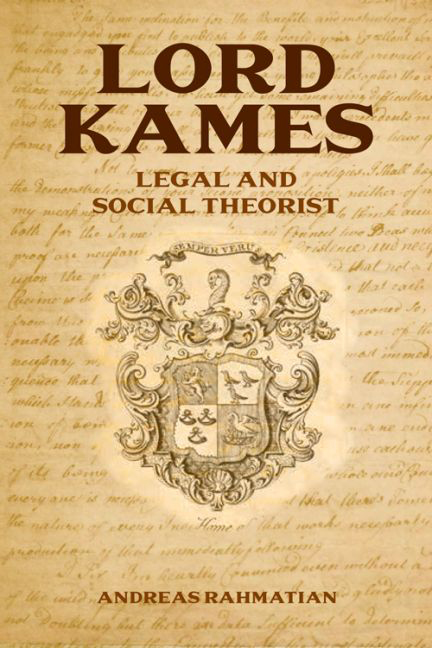Book contents
- Frontmatter
- Contents
- Preface
- Bibliography of Works by Lord Kames and Abbreviated References
- I Introduction
- II Aesthetics
- III Moral Philosophy I: Principles
- IV Moral Philosophy II: Development
- V Political Philosophy, Anthropology and Commerce
- VI Legal History, Legal Science and Comparative Law
- VII Property
- VIII Equity
- IX Obligations and Enforcement
- X Criminal Law
- XI Lord Kames's Influence on Some of the Founders of the United States
- XII A Critical Conclusion
- Bibliography
- Index
V - Political Philosophy, Anthropology and Commerce
Published online by Cambridge University Press: 12 September 2017
- Frontmatter
- Contents
- Preface
- Bibliography of Works by Lord Kames and Abbreviated References
- I Introduction
- II Aesthetics
- III Moral Philosophy I: Principles
- IV Moral Philosophy II: Development
- V Political Philosophy, Anthropology and Commerce
- VI Legal History, Legal Science and Comparative Law
- VII Property
- VIII Equity
- IX Obligations and Enforcement
- X Criminal Law
- XI Lord Kames's Influence on Some of the Founders of the United States
- XII A Critical Conclusion
- Bibliography
- Index
Summary
The Stages of Natural History of Society and of Progress as Part of Conjectural History
In the moral philosophy of the Scottish Enlightenment the moral sense derives from human nature. This foundation in human nature is associated with the aspiration of the Scottish philosophers to explore a universal speculative anthropological history of the development or progress of man and human society. Lord Kames is one of the central exponents of this project, alongside particularly Adam Ferguson, Lord Monboddo and John Millar, but that idea also appears, less prominently, in the works of David Hume and Adam Smith. Some facets of this anthropological-philosophical history of progress already appeared in the discussion of the development of reason, morals, manners and religion. Kames's Sketches of the History of Man (1774) is the consolidating work that epitomises this approach: ‘To trace out [the] progress toward maturity in different nations, is the subject of the present undertaking’. But this work draws considerably from Kames's earlier works.
Kames is one protagonist of a famous feature in the intellectual history of the Scottish Enlightenment, the notion that human societies developed in several (commonly four) relatively distinct stages based on modes of subsistence: the age of hunting, herding (age of shepherds), farming (age of agriculture) and the age of commerce as the most developed phase. It is a method by which Kames seeks to present and explain the routes of human progress in social history. The stadial theory of human development appears often and in different contexts in Kames's works. Rather than dwelling on an abstract analysis of the stadial theory, one may benefit from an example from Kames's writings, not a prominent example, but a short one and so suitable for a quotation. It describes the development of contractual obligations:
Originally, every family subsisted by hunting, and by the natural fruits of the earth. The taming [of] wild animals, and rendering them domestic, multiplied greatly the means of subsistence. The invention of agriculture produced to the industrious a superfluity, with which foreign necessaries were purchased. Commerce originally was carried on by barter or permutation, to which a previous covenant is not necessary. After money was introduced [transactions were first carried on] without any previous covenant… .
- Type
- Chapter
- Information
- Lord KamesLegal and Social Theorist, pp. 142 - 190Publisher: Edinburgh University PressPrint publication year: 2015

